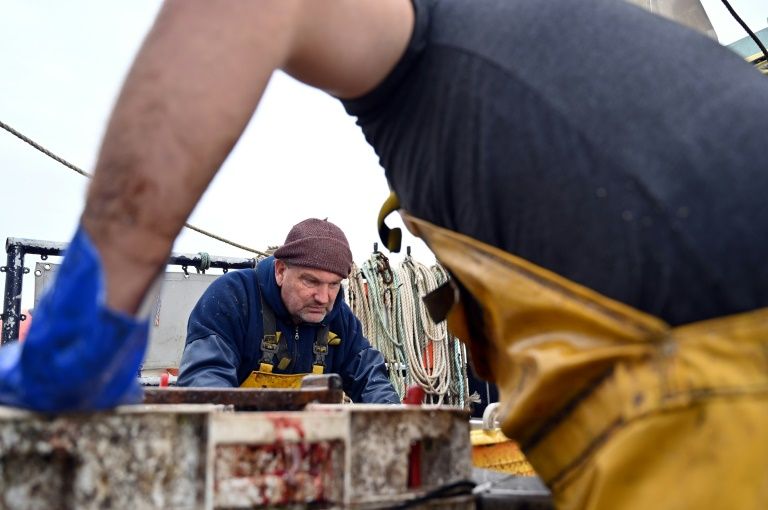UK fishermen hopeful of netting late deal in EU trade talks
Newhaven (United Kingdom) (AFP) – Trawling the Channel aboard his boat “About Time”, skipper Neil Whitney is hopeful the UK will net a post-Brexit trade deal with the EU that will finally favour British fishing.
A European Union summit on Thursday and Friday will attempt to unlock stalled talks, with London weighed down by wrangling over a key future fishing agreement.
“We want control of our waters, control of our own (fishing) quotas and we have to build a future because at the moment you can’t look ahead and try and work out what’s going to happen because we’ve got no control,” Whitney told AFP.
Whitney is based in the southern English port of Newhaven, less than 100 miles (160 kilometres) across the Channel from the French coast.
“Hopefully things will improve,” he said before setting off in the pitch black before dawn.
“Fingers crossed really,” he said, as the small wooden-hulled vessel set sail into the waters that have become a battleground in the deadlocked talks.
– ‘Critical point’ –
EU member France has taken the toughest line on fishing rights.
Last week, French fishermen from Boulogne warned they would go bankrupt if they were unable to fish in British waters.
Brussels insists its vessels must continue to enjoy unfettered access to UK waters even after a post-Brexit transition phase that ends on December 31.
Britain wants this access limited significantly and has called for fishing rights in its waters to be renegotiated annually.
“The negotiations with the EU are reaching a critical point with a very wide gap on fisheries,” said Barrie Deas, chief executive of the National Federation of Fishermen’s Organisations.
A “no-deal” would mean no automatic access to each other’s waters from January, the NFFO explained.
While wanting more control, Whitney acknowledged the possibility of selling restrictions on the fish caught by British fishermen was “a bit of a worry”.
“Our Belgian markets have said that they still need our fish and the big fish processor plant in (French port) Boulogne has said that they need British fish to keep going,” he said.
Newhaven fisherman Martin Yorwarth, whose family has worked in the trade for two centuries, wants to see EU fleets operating in English waters “cut to sustainable levels to enable fish stocks to recover from over-fishing”.
“The government’s been very focused on the negotiations,” he told AFP, adding that he did not think they had “taken the eye off the ball” as the coronavirus crisis deepens.
“This is the best government for fishing we’ve ever had,” Yorwarth insisted.
– ‘A lifestyle’ –
While fishing accounts for less than 0.1 percent of UK’s economic output, or GDP, it played a key role in the 2016 referendum in favour of exiting the EU.
Securing a deal is also being seen as politically critical to support for Boris Johnson’s Conservative government, which managed to make inroads into key coastal towns at last year’s election.
At the same time, a “no-deal” could strengthen the case for Scottish independence, with catches in Scotland making up almost half of the UK total.
“Most of us that are fishing, we do it because we love the job,” said Whitney, who was joined onboard by a deckhand helping to wash and box a catch that included plaice, sea bass and huss.
“It’s not so much a job, it’s more of a lifestyle,” said the veteran trawlerman.
That view was echoed by Hazel Curtis, director of corporate relations at Seafish, a public body representing the UK seafood industry.
“We know from listening to people throughout the UK fishing industry that many feel that fishing creates strong communities and that being part of that industry is a major part of people’s identity and their sense of self,” she said.
“Many people feel that we have a national identity as a seafaring nation.
“The full importance of fishing to the UK is not really captured by measures such as contribution to GDP.”
burs-bcp/phz/jxb/to
Disclaimer: Validity of the above story is for 7 Days from original date of publishing. Source: AFP.


